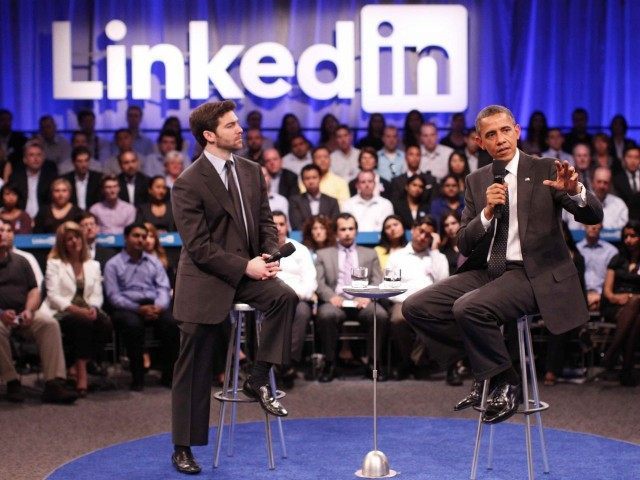LinkedIn’s epic $11.1 billion single-day-stock-plunge on February 5 represents the proverbial “ canary dying” in Silicon Valley’s gold mine as tech jobs are vaporized.
LinkedIn (NYSE:LNKD) was founded in the heart of Silicon Valley. Its CEO, Jeff Weiner is from PayPal; its founder, Reid Hoffman, is from Yahoo! Inc.; its venture capital came from Sequoia Capital–all storied Silicon Valley titans.
The company’s “Talent Solutions” began as a bulletin board in 2002 for the thousands of out-of-work Silicon Valley engineers and tech workers after the Dot-Com Bust. It quickly morphed into the premier national online job posting and resume distributing site for tech workers.
Driven by the bidding war for Silicon Valley technical talent over the last 6 years, LinkedIn’s “Recruiter” platform has grown at twice the national 30 percent annual growth of new tech jobs openings over the last three years.
The Bureau of Labor Statistics reported that by September 2015, the monthly national “Job Openings and Labor Turnover” report hit an all-time-record high with 5.4 million in job openings. Tech staffing demand dominated recruiting interest, with the national median annual salaries for software engineers jumping to $105,000, network engineers to $87,903, and research scientists to $85,000, according to the Glassdoor blog.
The median annual salaries for tech positions in Silicon Valley at the time averaged a 35 to 38 percent premium over national wages, according to Robert Haft corporate recruiters. More importantly, for Silicon Valley venture capital backed start-ups hoping eventually to strike it rich in lucrative initial public offerings (IPOs), enticing skilled tech workers to jump from established companies cost another 20 percent wage premium and big stock options.
With LinkedIn at the center of the Silicon Valley gold rush, the company’s stock rose about 150 percent from from early 2013 to peak out in late November 2015 at a price of $250 per share, valuaing the company with essentially no assets at a capitalization of $32.8 billion.
But just two weeks later, as Breitbart News noted, the IPO parade stopped. Despite the U.S. IPO market remaining strong in 2015, we warned that the tech sector was in the late stages of what the Gartner Group refers to as a “Hype Cycle,” similar to the period of shriveling of tech sector IPOs in 1999 and 2007, just before tech stocks tanked by over 50 percent.
Of the total of 169 IPOs that raised $29.9 billion in 2015, the tech sector’s percentage of deals was cut in half, to 14 percent. The 23 tech companies that were fortunate enough to go public raised a paltry $4.2 billion. About 60 percent of tech new issues 2015 recorded negative returns, led by Etsy Internet B2B supplier, which fell by 72 percent.
The LinkedIn earnings call after the close of trading on Feb. 4 started off with an upbeat report of beating analysts’ estimates of sale revenue and profit. But then LinkedIn shocked Wall Street by indicating its growth rate would be cut in half to about 20 percent for the year.
The stock collapsed the next day by over 44 percent, from $192 to $107. Based on a traditional securities analysis of valuation of the company’s future cash flows, Seeking Alpha’s Sophocles Sophocleous values LinkedIn at about $75. That would imply that the stock could crash by about another $9 billion.
Despite the fact that Facebook and Twitter still boast higher use among tech job seekers than LinkedIn, investors were so blinded by rumors of Silicon Valley companies trying to “poach” their competitors’ tech talent at wildly inflated wages and benefits that they bid-up LinkedIn as a “concept play” that far overshot the company’s fair valuation.
LinkedIn also has huge liabilities hidden in the company’s SEC filing footnotes, including over $1 billion in outstanding employee stock options that dilute the value of existing shares, and $620 million in lease obligations. Together, these liabilities represent roughly 150 percent of LinkedIn’s reported net assets.
Management’s forecast that LinkedIn’s “Talent Solutions” growth is slowing fast was confirmed when Breitbart News’ reported on February 4 that U.S. corporate layoffs in January surged 218 percent from the prior month, to 75,114. That was the highest level of after-Christmas downsizing since the depths of the 2009 Global Financial Crisis.
But more disturbing for Silicon Valley cheerleaders is the fact that the computer and telecommunications sectors, which had been in expansion mode almost every month for the last three years, were the third and fourth largest sectors for corporate layoffs, with 14,374 in job cuts.

COMMENTS
Please let us know if you're having issues with commenting.